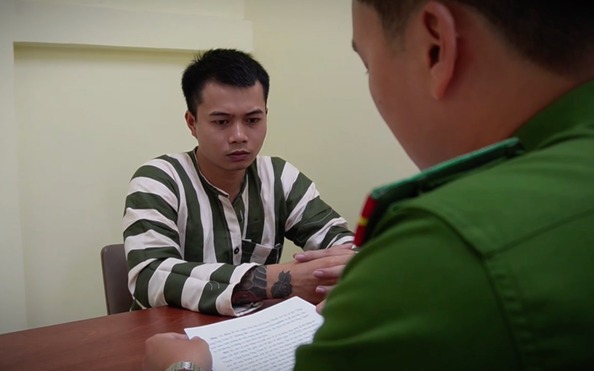Quoc Cuong had to alter his accent and conceal his motorcycle license plate so that those around him wouldn't discover he came from the...

Quoc Cuong had to alter his accent and conceal his motorcycle license plate so that those around him wouldn't discover he came from the central province of Thanh Hoa during his six years of university studies in Hanoi,
"Even now, I still can't forget the time a landlord directly turned me down, saying, 'I don't rent to people from Thanh Hoa' when I first arrived in the capital," said Cuong, 24.
He faced discrimination on the streets, and Cuong was frequently imitated by classmates. To blend in, he attempted to modify his accent to sound like a "standard Northern accent" in order to conceal his origins. When the Thanh Hoa students' club held a welcome event for new members, he declined to attend, worried that his identity as someone from Thanh Hoa would be revealed. Following an accident where he was called "That guy 36," Cuong began covering his motorcycle's license plate, as "36" is a slang term used to mock people from Thanh Hoa.
Having a comparable experience to Cuong, Ms. Nguyen Thu Hien, 42, from Thai Binh, initially began working at a private company in Ho Chi Minh City 10 years ago. Out of 15 employees, she was the sole individual with a Northern accent.
Each time Hien spoke, some coworkers laughed loudly and intentionally teased her. One day, someone exclaimed: "You look nice until you start talking with that 'Bac Ky' accent," using a disrespectful term for people from the north. The entire group agreed. When Hien expressed her annoyance, the coworker stated openly, "That accent is hard to listen to." They had an argument, and other colleagues had to step in.
Hien promptly headed to her supervisor's office to clarify and handed in her resignation. "I came here to work, not to be ridiculed about my origin," she said.
Regional bias wasn't limited to the workplace. When she and her boyfriend from the South met their families, both sides rejected the relationship. "My parents were worried I'd end up marrying far away, while his family claimed northern girls were strong-willed and not suitable for their way of life," Hien said.
In the end, their relationship came to an end.
 |
| Ban Thu Thao during a trip in 2024. Photo provided by Thu Thao |
On the other hand, Vu Minh Hang, 28, hailing from the southern area of Binh Duong,faced discriminationWhen she relocated to the northern area of Nam Dinh to get married, her husband's family criticized "Southern women for being lazy and only interested in fun," yet she and her boyfriend still chose to marry. The young couple had to move out to live independently in order to reduce tension. "I felt so trapped and upset that I wanted to leave my husband and go back to the South right away," Hang said.
Individuals facing regional discrimination, such as Cuong, Hang, and Hien, are not uncommon. This remains a long-standing problem in Vietnam, evident in everyday situations as well as on social media platforms. Many videos that intentionally provoke and create divisions between regions are widely spread. Recently, the Ho Chi Minh City Police temporarily arrested two TikTok creators, Tang Keng Ong Trum and Du Bau Troi, for consistently uploading content that is provocative, offensive, insulting, and regionally divisive.
A 2024 research conducted by the team Huynh An Nghiep from the University of Information Technology, VNU-HCM, found that as many as 40% of the 17,000 comments beneath videos concerning regional topics included offensive and demeaning language. The researchers propose that the long history of division in Vietnam has resulted in significant impacts, influencing the development of stereotypes.
This occurrence is not limited to Vietnam but can also be observed in various nations, including East and West Germany following their reunification, as well as the northern and southern areas in the U.S., Canada, and Australia.
 |
| Le Anh Diep, 30, the operator of the TikTok account Tang Keng Ong Trum, was detained for sharing videos that criticized flood relief activities and mocked residents, intensifying local discrimination. Photo by Ho Chi Minh City Police Department |
Associate Professor Dr. Nguyen Thi To Quyen, a senior lecturer at the Faculty of Sociology and Development, Academy of Journalism and Communication, states that the differences in economic and social conditions across regions greatly influence the opportunities available to various population groups, resulting in social hierarchy and strengthening stereotypes.
As she explained, this is a typical social-psychological process: individuals often reduce complexity through generalizations about groups, resulting in prejudice and discrimination in everyday situations.
Psychologist Dr. Bui Hong Quan from the University of Social Sciences and Humanities, VNU-HCM, suggests that regional bias typically arises from the tendency to generalize excessively or the desire to elevate one's status by belittling others.
Ban Thu Thao, a 26-year-old girl from the Dao ethnic group(The Dao are an ethnic group in Vietnam), also experienced regional discrimination during her upbringing. At the age of eight, when she moved from Lang Son to Nghe An to live with her grandparents, locals quickly labeled her as 'Con dan toc,' a derogatory term for ethnic minorities. "No matter what I did or said, that person would mock me. I despised them so much that I didn't even want to glance their way," she remembered.
Relocating to Hanoi for her job, she encountered new forms of discrimination: pressure to consume alcohol, as some believe ethnic individuals are good at drinking, and receiving inappropriate comments from male coworkers such as "I’ll keo vo" (Keo vo, also referred to as the "bride pulling" tradition, is a customary marriage practice among the Hmong people, based on mutual affection and true love, but in certain instances, it has been misinterpreted as "forced bride abduction" or "Can I come over to your place?" Ngu tham is a traditional practice of the Mường people, where an unmarried young man secretly enters a young woman's home at night to lie beside her, converse, and get to know her).
Unwilling to stay in this harmful atmosphere, Thao left her position.
Associate Professor Dr. To Quyen cautions that regional bias can lead to violence and undermine national unity. In the context of integration, a mindset of "Hanoi person – Nghe An person" or "the North – the South" will only cause society to lag behind.
Lawyer Nguyen Thanh Hai, head of An Hoang Gia Law Co., Ltd. (affiliated with the Hanoi Bar Association), mentioned that regional discrimination can be addressed through three stages: administrative, civil, and criminal. In online spaces, posting or spreading content that insults or promotes hatred may lead to fines ranging from 10 to 20 million VND. Victims are also entitled to seek compensation for emotional harm as per the 2015 Civil Code.
To avoid regional bias, he suggested three groups of solutions: strictly implementing penalty rules; mandating social media platforms to quickly delete prohibited content and work with authorities under the Cybersecurity Law; and at the same time, improving education about the culture ofrespecting regional diversity, particularly among young people.
"Before we type, we must consider our words," he stressed. "Each statement made online creates a legal record." Discussions should center on the topic itself, rather than targeting the source or cultural background.
Psychologist Bui Hong Quan holds the view that although individuals are shaped by their local culture, each person possesses unique characteristics and beliefs. Hence, striving to learn and demonstrate one's value through actions is the most effective method to overcome stereotypes.
After finishing his studies and beginning his career, Cuong slowly came to understand that his self-esteem was not connected to his hometown. In his workplace, many of the highest-performing employees were from the same region as him, helping to drive the company's growth and fostering a sense of unity, and they were greatly appreciated by the manager. He also realized that not everyone judges or belittles others based on regional differences.
Cuong now has friends from across the nation. Rather than feeling uncertain, Cuong confidently interacts with everyone, including partners, while using his local dialect.
After residing in Ho Chi Minh City for 10 years, Hien came to understand that not everyone looks down on people from the North. She encountered numerous welcoming and compassionate Southerners, which encouraged her to remain in the city. Her current in-laws are also from the South and have never shown any regional biases.
In the town where her husband is from, Hang chose to start her own business. The couple has since constructed a home and purchased a vehicle. "Now my mother-in-law and neighbors compliment my husband on his good fortune," she mentioned.



